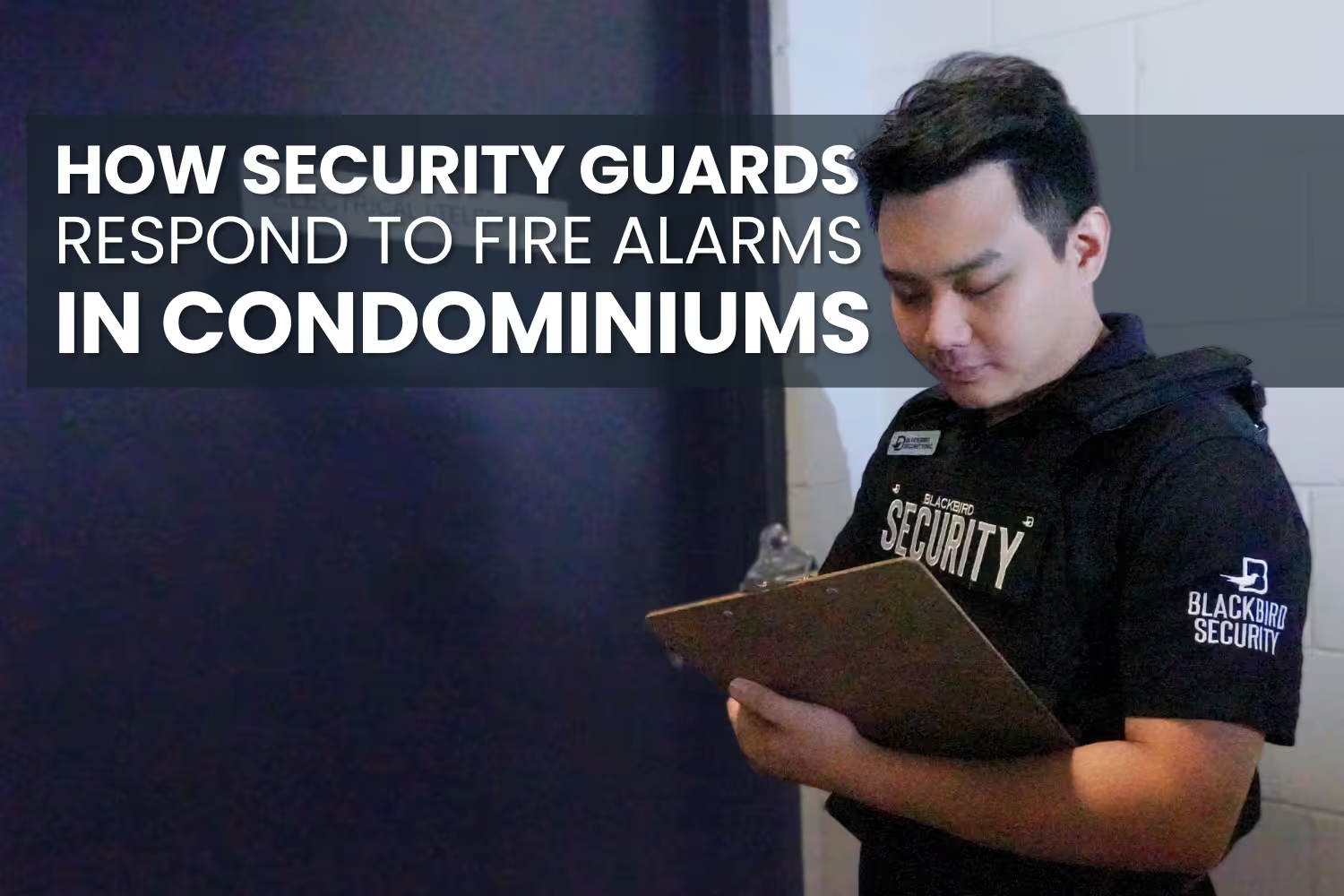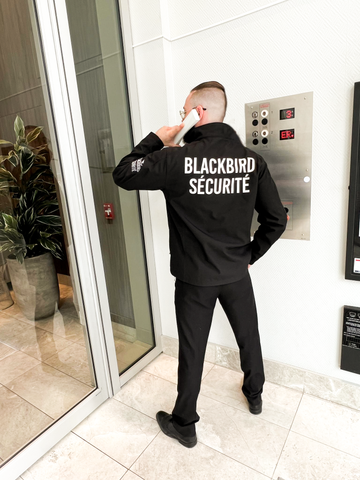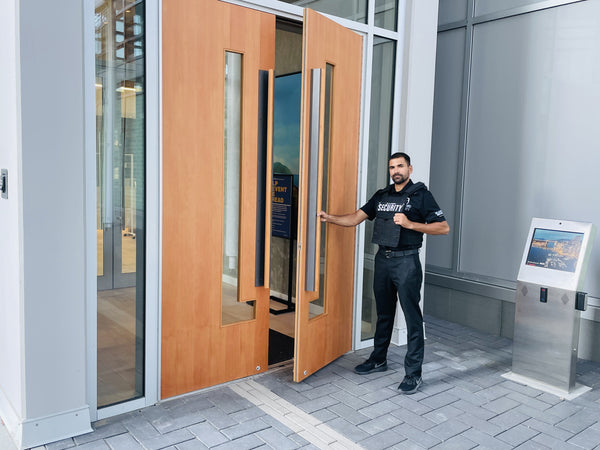Back
Back

The primary role of a residential security guard is to protect building occupants. Part of this key role is responding to emergencies, such as natural disasters and fires. In the event of a fire alarm in a condominium complex, security guards play a critical role in ensuring the safety and well-being of residents. Prompt response and decisive actions can make a significant difference in mitigating risks and facilitating a coordinated emergency response. In this blog, we’ll break down a condominium security guard’s standard emergency response protocol in case of a triggered alarm.

A condominium security guard’s responsibilities surround ensuring the safety of the building’s residents, including monitoring for unauthorized visitors, keeping access points secure, and responding to emergencies. One of the most common emergencies security guards face is triggered fire alarms.
Condominium security guards, including uniformed security guards and concierge security guards, are commonly the primary point of contact for building residents. As such, security guards are trusted by residents and serve a leadership role during emergencies, offering helpful assistance to building occupants.
Beyond assisting residents, security guards are often the only building staff members available to enact fire safety plans, including operating button and switch panels, communicating with emergency services, and safely evacuating residents.
Condominium security guards must be well-versed in the specific fire safety protocols unique to their building. Property managers and security guards should work together to keep safety plans up-to-date and communicated across teams. Here’s a general breakdown of each step in the process of responding to a fire alarm:
Security personnel are often the first to respond to a fire alarm thanks to surveillance systems and sensors within buildings which can be triggered before a building-wide alarm sounds. The first step in responding to a fire alarm is registering that the alarm is ringing. Security guards should always be alert and stay distraction-free while on duty.
Once the fire alarm sounds, a security guard must first locate the fire alarm's source by analyzing digital information at the front desk. This will tell the security guard which building the fire alarm was triggered in (if the condominium has multiple buildings), the area of the building such as the parkade, hallway, lobby, etc., and the building floor, as well as a map of the location.

The next step is to call 911 immediately. The security guard must tell the operator the address, the building name, and the precise location of the triggered alarm.
Condominium buildings in BC will have a fire safety plan box in an easily accessible location. A condo security guard must unlock the box and collect the key to give to the fire marshall when they arrive.
Each condominium building will have a different plan of action to execute at this stage. Additional steps may include operating the condo’s CACF room panel and making announcements to the building. Condo security guards must have an in-depth understanding of unique building fire safety procedures at all times.
A well-trained condominium security guard will provide a reassuring presence and helpful assistance to building residents during an evacuation. Residents must not stampede for the exits, which can result in injuries and slow down the evacuation process. Too many individuals crowding toward one exit can create hazardous blockages. The responsibilities of a condominium’s security guard team include maintaining order, providing guidance, and directing occupants toward the nearest and safest exit routes in the event of an emergency. If the situation demands it, the guards should disperse the crowd and utilize multiple safe exits to facilitate an orderly evacuation process.
Additionally, security guards must ensure that residents do not re-enter the building until the fire marshall has declared the condominium safe for entry.
Condominium security guards should be trained and equipped to handle first-aid needs before paramedics arrive. If necessary, a security guard can administer first aid such as CPR for individuals suffering from smoke inhalation.
Once fire trucks arrive, a security guard must meet the fire marshall and hand them the key from the fire safety plan box as well as direct them to the elevators. The firefighters will begin their investigation and return to the lobby when complete. A security guard must then bring the fire marshall to the CACF room where they will reset the alarms.
Once the situation has been handled and residents have returned safely inside, a condo security guard must write a detailed report of the incident, including the time and location where the alarm was triggered, steps taken, building damage if applicable, and the cause of the triggered alarm. Report writing is essential for analyzing patterns in false alarms as well as assessing damage in real-case fires.

For buildings that don’t have a static security presence, mobile security patrols provide an essential layer of protection in case of emergencies. Mobile security guards will enact the same procedures as static security guards. When a condominium building partners with Blackbird Security to implement mobile security patrols, residents and building management alike can rest assured knowing their safety is protected at all hours.
When an alarm is triggered, the Blackbird Security 24/7 Control Centre team will immediately deploy a mobile security guard to the scene to assess the situation and enact the building’s fire safety plan. This gives residents peace of mind, who may otherwise be forced to navigate the challenging situation alone, as well as streamlines the process for first responders.
Condominium security guards play a crucial role in securing the safety of residents during fire alarm procedures. The right security team will not only enact a building’s fire safety protocols but also provide a reassuring and helpful presence to its residents.
We take safety seriously at Blackbird Security, which is why our condominium security guards are not only trained in the safety processes of the buildings they protect, but also undergo extensive training in Customer Service, Peaceful De-escalation, Report Writing, Standard First Aid, and so much more. Read more about how Blackbird Security guards have played critical roles in emergencies here.
Partner with a condominium security you can count on by getting in touch with us at the form below.
Find out more about the roles and responsibilities of condo security guards in our Definitive Guide to Condominium Security.



